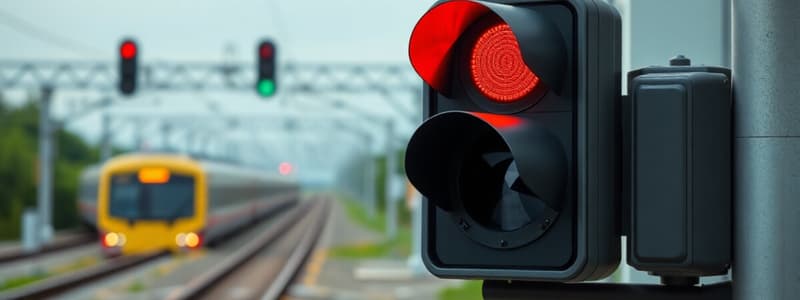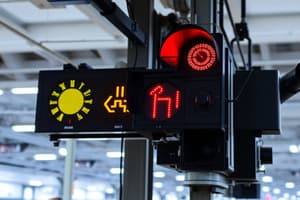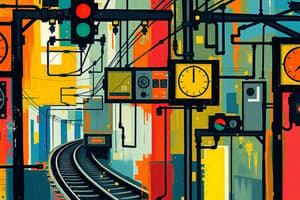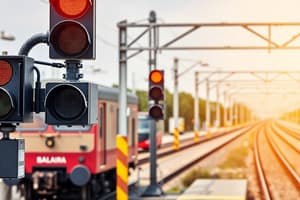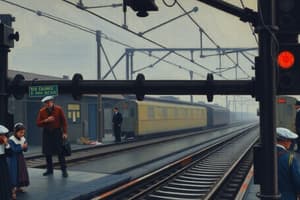Podcast
Questions and Answers
What should the Loco Pilot do if the stoppage is due to an accident and the train cannot proceed?
What should the Loco Pilot do if the stoppage is due to an accident and the train cannot proceed?
- Immediately resume normal operations.
- Place two detonators at 500 meters and wait.
- Notify the Train Manager and back the train.
- Sound the prescribed code of whistle and inform the Train Manager. (correct)
When a train is detained outside signals for more than 10 minutes, what action must be taken?
When a train is detained outside signals for more than 10 minutes, what action must be taken?
- The Loco Pilot must sound a different whistle code.
- The train should be backed to the last signal.
- No action is needed.
- It must be protected by placing detonators. (correct)
In the absence of the Train Manager, who is responsible for protecting the train?
In the absence of the Train Manager, who is responsible for protecting the train?
- The Conductor of the train.
- The Station Master.
- The Loco Pilot. (correct)
- The Section Controller.
What must be done before backing a train under exceptional circumstances?
What must be done before backing a train under exceptional circumstances?
What action must be taken if there is reason to suspect that the line for temporary single line working is damaged?
What action must be taken if there is reason to suspect that the line for temporary single line working is damaged?
What happens once any means of communication has been restored?
What happens once any means of communication has been restored?
What is the function of Form No.T/I 602 in this context?
What is the function of Form No.T/I 602 in this context?
Who has the authority to nominate the stations for temporary single line working?
Who has the authority to nominate the stations for temporary single line working?
What must be done with the Semi-Automatic/Manual Dispatch Stop Signals at both ends before introducing temporary single line working?
What must be done with the Semi-Automatic/Manual Dispatch Stop Signals at both ends before introducing temporary single line working?
What should the Station Master do after receiving a communication restoration message?
What should the Station Master do after receiving a communication restoration message?
What is required to control the movement of trains during temporary single line working?
What is required to control the movement of trains during temporary single line working?
What condition must be met before normal operations can resume after communication is restored?
What condition must be met before normal operations can resume after communication is restored?
Which of the following is NOT a means of communication for obtaining line clear during the single line operation?
Which of the following is NOT a means of communication for obtaining line clear during the single line operation?
What should be done with the Semi-Automatic/Manual Reception Stop Signals before initiating temporary single line working?
What should be done with the Semi-Automatic/Manual Reception Stop Signals before initiating temporary single line working?
What is the primary step before introducing temporary single line working on a double track section?
What is the primary step before introducing temporary single line working on a double track section?
Which personnel must be consulted before marking the introduction of temporary single line working?
Which personnel must be consulted before marking the introduction of temporary single line working?
What is the purpose of the 'Conditional Line Clear Message' before dispatching the engine?
What is the purpose of the 'Conditional Line Clear Message' before dispatching the engine?
What form is used for the 'Conditional Line Clear Message'?
What form is used for the 'Conditional Line Clear Message'?
What should be observed when the engine is returning on its journey?
What should be observed when the engine is returning on its journey?
Which entity is responsible for issuing the Conditional Line Clear Ticket upon arrival at the station?
Which entity is responsible for issuing the Conditional Line Clear Ticket upon arrival at the station?
What document must the Station Master record upon the arrival of the engine?
What document must the Station Master record upon the arrival of the engine?
When reaching the station, where should the engine stop?
When reaching the station, where should the engine stop?
What are the options for vehicles that may run at a normal speed when returning?
What are the options for vehicles that may run at a normal speed when returning?
Which form is used for issuing the Conditional Line Clear Ticket when there is a waiting train?
Which form is used for issuing the Conditional Line Clear Ticket when there is a waiting train?
What is the AUTHORITY D 912 used for?
What is the AUTHORITY D 912 used for?
Which authority allows for temporary single line working on double line sections?
Which authority allows for temporary single line working on double line sections?
What conditions warrant the usage of AUTHORITY B 912?
What conditions warrant the usage of AUTHORITY B 912?
Under which circumstances is AUTHORITY C 912 applicable?
Under which circumstances is AUTHORITY C 912 applicable?
In an automatic block system, which option describes the scenario for AUTHORITY A 912?
In an automatic block system, which option describes the scenario for AUTHORITY A 912?
Which authority is relevant in opening communication during a total interruption on a single line section?
Which authority is relevant in opening communication during a total interruption on a single line section?
Which AUTHORITY refers specifically to working trains under obstruction of one line when signals are operative?
Which AUTHORITY refers specifically to working trains under obstruction of one line when signals are operative?
What does AUTHORITY 510 provide for train operations?
What does AUTHORITY 510 provide for train operations?
What is the maximum time frame for a Transportation Inspector to submit a report after the resumption of communication?
What is the maximum time frame for a Transportation Inspector to submit a report after the resumption of communication?
Who must certify that the unobstructed line is safe for passage of trains before introducing single line working?
Who must certify that the unobstructed line is safe for passage of trains before introducing single line working?
What specific assurance must pilots of trains receive regarding trap points?
What specific assurance must pilots of trains receive regarding trap points?
What must the SM of the station at the end of the affected section do upon receiving the engineering official's certificate?
What must the SM of the station at the end of the affected section do upon receiving the engineering official's certificate?
What does the approach Stop signal indicate to trains on the affected section?
What does the approach Stop signal indicate to trains on the affected section?
What must be done to all crossover points while temporary single line working is in force?
What must be done to all crossover points while temporary single line working is in force?
What must be clearly stated on the caution for pilots of trains?
What must be clearly stated on the caution for pilots of trains?
What triggers the introduction of single line working in double line sections during an interruption of communication?
What triggers the introduction of single line working in double line sections during an interruption of communication?
What must the Station Master at the station in rear obtain for the train?
What must the Station Master at the station in rear obtain for the train?
What condition must be met before the Station Master in advance gives 'Line Clear'?
What condition must be met before the Station Master in advance gives 'Line Clear'?
What should the Loco Pilot do if visibility is restricted due to conditions like fog?
What should the Loco Pilot do if visibility is restricted due to conditions like fog?
Which of the following is NOT a means of communication mentioned for obtaining 'Line Clear'?
Which of the following is NOT a means of communication mentioned for obtaining 'Line Clear'?
What speed restriction applies to the Loco Pilot when entering the affected section?
What speed restriction applies to the Loco Pilot when entering the affected section?
What should the Station Master ensure about the Semi-Automatic/Manual Reception Stop Signals?
What should the Station Master ensure about the Semi-Automatic/Manual Reception Stop Signals?
Which method is NOT stated for checking the identity of the Station Master on duty?
Which method is NOT stated for checking the identity of the Station Master on duty?
When should the points of outlying sidings/turnouts be directly set and locked?
When should the points of outlying sidings/turnouts be directly set and locked?
Flashcards
Manual Mode in Signaling
Manual Mode in Signaling
The state of a signaling system where trains are controlled by manual intervention rather than automatic signals.
Semi-Automatic/Manual Reception Stop Signal
Semi-Automatic/Manual Reception Stop Signal
The signal that indicates a train can proceed into a station or section controlled by manual operation.
Line Clear Procedure
Line Clear Procedure
The process of ensuring a clear track for a train to proceed after the automatic signaling system has been suspended.
Station Master Communication
Station Master Communication
Signup and view all the flashcards
Authority Form T/D 912
Authority Form T/D 912
Signup and view all the flashcards
Train Speed Limit (25 Kmph)
Train Speed Limit (25 Kmph)
Signup and view all the flashcards
Reduced Speed Limit (10 Kmph)
Reduced Speed Limit (10 Kmph)
Signup and view all the flashcards
Speed Limit at Facing Points (15 Kmph)
Speed Limit at Facing Points (15 Kmph)
Signup and view all the flashcards
Temporary Single Line Working
Temporary Single Line Working
Signup and view all the flashcards
Sr.DOM
Sr.DOM
Signup and view all the flashcards
Nominated Stations
Nominated Stations
Signup and view all the flashcards
Track Safety Certification
Track Safety Certification
Signup and view all the flashcards
Semi-Automatic/Manual Dispatch Stop Signal
Semi-Automatic/Manual Dispatch Stop Signal
Signup and view all the flashcards
Line Clear Communication
Line Clear Communication
Signup and view all the flashcards
Line Clear Communication Methods
Line Clear Communication Methods
Signup and view all the flashcards
Conditional Line Clear Reply Message
Conditional Line Clear Reply Message
Signup and view all the flashcards
Form No. T/F 602
Form No. T/F 602
Signup and view all the flashcards
Train stopped due to exceptional cause
Train stopped due to exceptional cause
Signup and view all the flashcards
Conditional Line Clear Ticket
Conditional Line Clear Ticket
Signup and view all the flashcards
Train Manager protection for stopped train
Train Manager protection for stopped train
Signup and view all the flashcards
Protecting a detained train
Protecting a detained train
Signup and view all the flashcards
Return Speed for Engine
Return Speed for Engine
Signup and view all the flashcards
Loco Pilot's responsibility when Train Manager is absent
Loco Pilot's responsibility when Train Manager is absent
Signup and view all the flashcards
Engine Arrival Procedures
Engine Arrival Procedures
Signup and view all the flashcards
Backing up trains
Backing up trains
Signup and view all the flashcards
Station Master Reception
Station Master Reception
Signup and view all the flashcards
Efficient Message Flow
Efficient Message Flow
Signup and view all the flashcards
Restoring communication between stations
Restoring communication between stations
Signup and view all the flashcards
Types of Engines/Vehicles
Types of Engines/Vehicles
Signup and view all the flashcards
Resuming normal working
Resuming normal working
Signup and view all the flashcards
Informing the Section Controller
Informing the Section Controller
Signup and view all the flashcards
Total interruption of communication
Total interruption of communication
Signup and view all the flashcards
Single line working
Single line working
Signup and view all the flashcards
Engineering official in single line working
Engineering official in single line working
Signup and view all the flashcards
Safety certificate
Safety certificate
Signup and view all the flashcards
Caution order for single line working
Caution order for single line working
Signup and view all the flashcards
Station at the end of the affected section in single line working
Station at the end of the affected section in single line working
Signup and view all the flashcards
Semi-Automatic/Manual Dispatch Stop Signal under single line working
Semi-Automatic/Manual Dispatch Stop Signal under single line working
Signup and view all the flashcards
Approach Stop Signal under single line working
Approach Stop Signal under single line working
Signup and view all the flashcards
Authority for Working of Trains During Prolonged Signal Failure in Automatic Block System (D 912)
Authority for Working of Trains During Prolonged Signal Failure in Automatic Block System (D 912)
Signup and view all the flashcards
Authority for Working of Trains During Total Interruption of Communication/Obstruction on Line in Automatic Block System (B 912)
Authority for Working of Trains During Total Interruption of Communication/Obstruction on Line in Automatic Block System (B 912)
Signup and view all the flashcards
Authority for Temporary Single Line Working on Double Line Automatic Block System (E 912)
Authority for Temporary Single Line Working on Double Line Automatic Block System (E 912)
Signup and view all the flashcards
Authority to Pass Signals in 'On' or Defective Position (369(3b))
Authority to Pass Signals in 'On' or Defective Position (369(3b))
Signup and view all the flashcards
Authority to Proceed for Relief Engine/Train into an Automatic Block Signalling Section (C 912)
Authority to Proceed for Relief Engine/Train into an Automatic Block Signalling Section (C 912)
Signup and view all the flashcards
Authority For Opening Communication During Total Interruption of Communication on Single Line Section (B 602)
Authority For Opening Communication During Total Interruption of Communication on Single Line Section (B 602)
Signup and view all the flashcards
Authority to Receive a Train on a Non Signalled Line (510)
Authority to Receive a Train on a Non Signalled Line (510)
Signup and view all the flashcards
Authority for Temporary Single Line Working On Double Line Automatic Block Signaling Territories
Authority for Temporary Single Line Working On Double Line Automatic Block Signaling Territories
Signup and view all the flashcards
Study Notes
Unified Subsidiary Rules under GR 9.12
- Issued by the Railway Board on 16.08.2024
- Unified Subsidiary Rules under GR 9.12 will be implemented in Zonal Railways after issuing an addendum and corrigendum slip of G& SR from concerned Railway.
Procedure during Automatic Signaling Failure
- When automatic signaling failure is likely to last a while or cause delay, trains are to be worked from station to station over the section or section(s) concerned under special instructions. (GR 9.12)
Unified Subsidiary Rules to General Rules 9.12
- Main objective of the committee was to provide clear instructions to station master, loco pilot, and train manager for the working of trains during automatic signaling failure.
- The committee recommended the following provision in the Unified Subsidiary rules to GR 9.12. A new paragraph 9.12/1 states that during signal failure in an automatic block system, train operations will be in accordance with rule 9.02 (DL) and rule 9.07 (SL).
Forms T/A 912, T/D 912, T/B 912, T/C 912, T/B 602 & T/512
- Forms are reframed for issues including one or more of the following authorities: obtaining line clear; Proceed without line clear; circumstances under which authority given; caution order specifying the speed to be followed.
- Line clear ticket T/C-912 used for sending Relief Engine/Train in case of obstruction or accident in Automatic Block Signaling section.
Unified SR 9.12
- Standardizes procedures for temporary single line working on double line automatic block signaling territories.
- The unified rule caters to common failures across zonal railways.
- The special cases of double-line and single-line operations are handled.
Forms T/369(3b)
- Standard forms are used along with the Unified Subsidiary Rule for Passing a Signaling given at 'ON' Condition for automatic signals. A standard format for this process is in place.
Unified Subsidiary Rule 9.12/1
- In case of failure of signal(s) between two or more block stations in an automatic block system, train working should normally be done in accordance with the provisions of Rule 9.02 or 9.07, as the case may be.
Unified Subsidiary Rule 9.12/2 (A) and (B)
- Failure of signal(s) between two or more block stations in an automatic block system, likely to last for some time (or) cause serious delay when means of communication are available.
Procedures for Train Working in Case of Prolonged Failure of Signal(s)
- Intimation of prolonged failure is to be given to concerned duty SM by Section Controller under exchange of private number
- Before any train is allowed to enter the affected section, it shall be brought to a stand and the Loco Pilot/ Train Manager of the train shall be advised of the circumstances
- The section between the two block stations will be treated as a single block section
- Before introducing this working, ensure trains dispatched in the affected section have completely arrived in advance.
Semi-Automatic/Manual Dispatch and Reception of Signals
- Ensure Semi-Automatic/Manual Dispatch Stop Signals and Reception Stop Signals of all stations are in manual mode in ON position initially.
- Station Master to provide advice to the other Station Master on suspension of Automatic working.
Different Procedures & Forms
- Different forms, such as T/A 912, T/D 912, and various other forms are used for different procedures during train operations for clarity and standardization.
- The instructions on usage of certain tools and processes are also detailed
Additional Procedures (Train Working)
- Loco Pilot of the first train must follow authority form T/D 912 and speed restrictions.
- Before any train to enter the block section, the SM must ensure private numbers received from gatemen under his control, ensuring all points are correctly set and locked.
- If view restrictions are in place (fog, curve or other reason), speed should not exceed 10 KMPH. Speed over facing points must be restricted to 15 KMPH.
- When approaching train reception station, Locomotive Pilot must observe aspects of Semi–Automatic/ Manual Reception Stop signal/Calling on signal
- When approaching the station, inform Loco Pilot and Train Manager about Automatic, Semi–Automatic/ Manual Signal requirements to be passed.
- When signals fail, Locomotive Pilot must pass relevant signals in ON and have railway servant sign confirming the passing of the signals at ON position.
Methods of Communication during Fault
- Use station to station fixed telephones when available
- Use railway auto phone & BSNL/MTNL phone with caller ID
- Use of Control telephones
- Utilize VHF (under instructions, not the sole means)
- Using fixed telephone with CUG where possible
Section Clearance & Messages
- Section clearance by each train is to be intimated to the rear station
- Section controllers to be kept advised of ongoing activities
- Signals to be put right by S&T officials,
- Permission to resume normal train operation required by train controllers
- Messages exchanged with private numbers (when communicated)
Train Working Records
- All records related to train working on the system should be retained
- Transportation Inspector must review and submit a report to the Sr. DOM within 7 days of resuming normal working.
Rules and Regulations for Single Line Working
- Rules and regulations for single line working on double line sections in an Automatic Block System are addressed.
- These rules come into play whenever the obstruction causes one line to be used, or if no means of communication are possible.
- There are rules to take in consideration locations where the view ahead is restricted (such as fog, curve or other reason).
- The designated official of the Engineering Department will issue a certificate indicating that the other line on which single line working will be introduced is free.
Additional Train Working Procedures & Forms
- Clarifies forms and processes for passing signals when one line is obstructed, in both right and wrong lines.
- Forms like T/E 912, T/A 912 and other supporting forms
- Procedures for trains passing signals, with focus on cautious movement, point locking, and caution orders.
- Instructions concerning when a train can proceed, with line clear, and when the authority to proceed without line clear must be sought. This includes procedures at tunnels, using hand signals and other safety measures.
- Procedures for trains running on the wrong line, including the speed limits to be maintained and the procedure for bringing the train to a stop outside the appropriate signals. Additional forms like T/510 and a written authority/form are required.
Special Cases
- Clarifies specific conditions, like when one or more signals are likely to last for some time and/or cause serious delay, as well as conditions with no means of communication. Specific rules cover those circumstances for single or double line sections and trains operating on them.
- Clarifies actions for different cases involving obstruction on one line of a block section, when signals are operative. Procedures for temporary single line operation and their restoration.
Resumption of Normal Working
- To restore normal working, the signals must be restored, and the stations must ensure all trains and engines are accounted for prior to restoring the system to normal work.
- A clear message stating this is exchanged between stations via private numbers. The message details the specific train(s) that occurred during that time of system interruption.
Additional Guidelines (Rules and Regulations)
- Rules and regulations for signaling during interruptions and obstruction
- Guidelines on issuing and usage of forms for various actions.
- Procedures for restoring normal train operations after a disruption of communication on a double line section, especially if it causes a complete failure of communication.
Studying That Suits You
Use AI to generate personalized quizzes and flashcards to suit your learning preferences.
